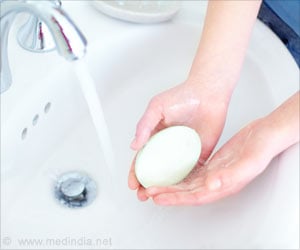Two common bacteria that cause colds, ear infections, strep throat and more serious infections cannot live for long outside the human body, finds numerous scientific studies.

"These findings should make us more cautious about bacteria in the environment since they change our ideas about how these particular bacteria are spread," says senior author Anders Hakansson, PhD, assistant professor of microbiology and immunology in the UB School of Medicine and Biomedical Sciences. "This is the first paper to directly investigate that these bacteria can survive well on various surfaces, including hands, and potentially spread between individuals."
S. pneumoniae, a leading cause of ear infections in children and morbidity and mortality from respiratory tract infections in children and the elderly, is widespread in daycare centers and a common cause of hospital infections, says Hakansson. And in developing countries, where fresh water, good nutrition and common antibiotics may be scarce, S. pneumoniae often leads to pneumonia and sepsis, killing one million children every year.
S. pyogenes commonly causes strep throat and skin infections in school children but also can cause serious infection in adults.
The UB researchers found that in the day care center, four out of five stuffed toys tested positive for S. pneumonaie and several surfaces, such as cribs, tested positive for S. pyogenes, even after being cleaned. The testing was done just prior to the center opening in the morning so it had been many hours since the last human contact.
Hakansson and his co-authors became interested in the possibility that some bacteria might persist on surfaces when they published work last year showing that bacteria form biofilms when colonizing human tissues. They found that these sophisticated, highly structured biofilm communities are hardier than other forms of bacteria.
He explains that studies of how long bacteria survive on inanimate objects have used cultures grown in laboratory media, called broth-grown planktonic bacteria, and invariably show that bacteria die rapidly.
The UB experiments found that month-old biofilm of S. pneumoniae and S. pyogenes from contaminated surfaces readily colonized mice, and that biofilms survived for hours on human hands and persisted on books and soft and hard toys and surfaces in a daycare center, in some cases, even after being well-cleaned.
"In all of these cases, we found that these pathogens can survive for long periods outside a human host," says Hakansson. But, he says, the scientific literature maintains that you can only become infected by breathing in infected droplets expelled through coughing or sneezing by infected individuals.
"Commonly handled objects that are contaminated with these biofilm bacteria could act as reservoirs of bacteria for hours, weeks or months, spreading potential infections to individuals who come in contact with them," concludes Hakansson. He cautions that more research should be done to understand under what circumstances this type of contact leads to spread between individuals.
"If it turns out that this type of spread is substantial, then the same protocols that are now used for preventing the spread of other bacteria, such as intestinal bacteria and viruses, which do persist on surfaces, will need to be implemented especially for people working with children and in health-care settings," he adds.
Source-Eurekalert
 MEDINDIA
MEDINDIA



 Email
Email







